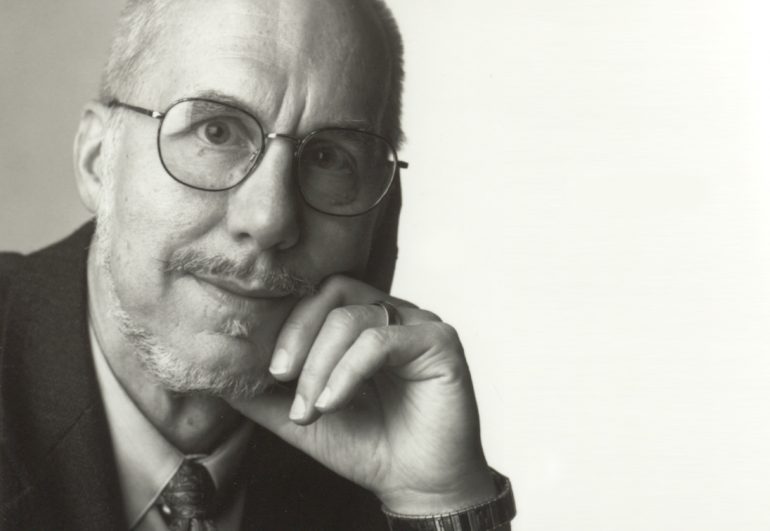All of the world’s great religions ask us to turn–turn away from harm and wrongdoing, turn towards our neighbor, turn our perspectives around, turn towards the divine. Larry Rasmussen, one of the world’s foremost environmental ethicists believes that Christianity is at a critical point in its own history; it’s about to go through a massive turn, too.
Rasmussen’s most recent book, Earth-Honoring Faith: Religious Ethics in a New Key (Oxford University Press), is the 2014 Nautilus Book Awards: the Gold Prize for best book in in Ecology/Environment and the Grand Prize for best book overall.
Over the past two months I have interviewed Larry by phone, talking about what religion, what Christianity, has to say about ecology, where the good news is in the midst of the changing climate, and how we are to turn towards a new perspective in our relationship with God’s good creation.
Where did your interest in religion begin?
[openquote]It’s always been there. I grew up in southwest Minnesota, in the Lutheran church, which, along with the school, was the major institution in my community. There’s never been a time when the church hasn’t been part of my life–it’s a continuous community of reference. Even through high school and college there was never a time when I left, only to come back later. I probably wouldn’t know what to do without going to church.[closequote]
Where did your interest in the environment begin?
[openquote]In childhood. But I wasn’t aware of it in a conscious way. I grew up on the west branch of the Des Moines River. And if play is a child’s work, my “homework” was all outdoors. Yet the world around is not something one pays much attention to in a reflective way, it’s just “natural.” In any event I’m certain the imprinting of the natural world made a lasting difference, as does any childhood environment and ethos.
My explicit and self-conscious interest came later, in graduate school, when Roger Shinn, my doctoral adviser, was involved in the World Council of Churches. The WCC gave the world the notion of sustainability as it pertains to society (rather than, say, to timber harvesting, fish catch, or other resources). This was in the early 1970s and Shinn was instrumental from the beginning in getting the conversation started about a “just, participatory, and sustainable” society. I carried that with me into the “energy crisis” of the Carter years and the rise of OPEC. At that point I started teaching and writing on environmental issues and the church’s response.[closequote]
How has landscape impacted you?
[openquote]Between landscape as a child and landscape in the city, there’s a dramatic difference.
And while the world of farming and a little village, Petersburg, MN, was no doubt important, my career years have all been urban, spent in inner city Washington, D.C. and New York City. My attention there included urban ecological issues. Urban landscape and habitat was a critical part of it but the environmental issues took a different shape. The attention was chiefly to public health and a need for decent housing, jobs, and neighborhood green space. Schools next door to city bus garages meant high asthma rates for the kids, for example. The ecological issues were, differently said, also social justice issues. At the same time, they were issues largely neglected by the major environmental organizations, like the Sierra Club or Natural Resources Defense Council, World Wildlife Fund, etc. Not least, these organizations were basically white, wealthy, and suburban. It was only after the Environmental Summit of the Peoples of Color, in 1992, that the ecological issues of the urban and rural poor found a public profile and an alternative environmentalism, one truer to the reality of the diverse demographics of the city.[closequote]
How can churches and religious leaders help us think better or more clearly about ecology and environmental stewardship?
[openquote]Is stewardship the right notion? In our culture stewardship easily falls into the profound dualism of humanity vis à vis nature. When we say “nature,” we typically think of something we’re responsible for rather than intrinsically a part of in our very being and belonging. “Environment” is that which surrounds us and stewardship is regarded as good management of that external reality. “Creation care” can carry this same erroneous subject (us) to object (nature) relationship.
Is not this relationship the modern version of a master-slave ethic? And is not this the default position that clicks in when we say “stewardship”?[closequote]
How does ecology help enrich the gospel message?
[openquote]They connect and interact in several meaningful ways.
The natural world under siege is likely to push world religions to take another look at the meaning and riches of creation in their own traditions (or, alternatively, the paucity of those understandings). “Creation” is a theological word more than a science word. (“Nature” is the science word and it doesn’t assume God.) And it’s a common word of great import, i.e., all religions understand creation as a bearer of mystery, wonder, knowledge and sacred value. Not surprisingly, then, most religious symbols are manifestations of the natural world—the sacred mountain, the tree of life, the rivers of crystalline waters, the lotus flower, a crescent moon, tongues of fire, a feather. Water, breath, spirit, flame, soil and verdant paradise—these are religious symbols as the human response to the enveloping natural world from which they are taken.
But because these are now endangered at human hands, there will likely be religious reevaluation of a creation that has not only been taken for granted, but exploited and plundered.
Still, renewed attention to planetary creation is not the only agenda. The changed planet itself is. If the geologists and climatologists are right, we’re entering a new geological epoch, already christened the Anthropocene. The composition of the atmosphere and oceans is changing, as are the hydrological system and land-masses (witness the breaking up of West Antarctica, guaranteeing eventual future sea level rise).
This impact on the planet, by way of cumulative human activity, will lead to other understandings of critical theological base points. Not only creation, but who we are in the scheme of things. And we’ll go on to “What do we mean by redemption?” for a creation that groans in travail, awaiting the salvation of human beings.
All this tallies as a mandatory Reformation that includes reviewed and renewed practices. If, for example, nearly all religions have water rites and the oceans are souring and water is a huge issue in the form of drought and/or deluge, then how are traditional water rites practiced as a part of worship? In the same casual way, bearing the same meaning? Or is there a new twist and another level of metaphorical meaning?
The stark occasion for this prospective Reformation is that human beings have never been here before. We’ve never inaugurated a new geological epoch. Everything that gave rise to the religious practices and their meaning happened in the Holocene, the mark of which has been relative climate stability and the triumph of life over and again, despite nature’s predilections to try anything once, including Little Ice Ages.
If the mark of the Anthropocene, by contrast, is an insecure climate and a volatile natural world, then religions can’t carry the same assumptions they long have. Practices, rituals, texts, and teachings have all assumed a certain geological certainty as their habitat. This provided a stability we could count upon and return to, like the rhythms of seedtime and harvest or the rites of springtime and renewal.
We, however, don’t know what worldwide climate change will bring, so we’re inching closer to a more basic and long-term uncertainty and insecurity than any we’ve known. The future may be radically different from any we’ve ever seen, even imagined. “We just don’t know” may be the common refrain. We don’t know about food security. California doesn’t know about water. Will Florida and South Pacific Island nations edge toward a new Atlantis? This lack of core confidence in a trustworthy habitat as the décor of the human is what we face.[closequote]
What do the religious traditions do in the face of this deep uncertainty about planetary creation?
[openquote]Climate change is baked-in for awhile. It cannot be dialed back for either present or near-future generations. For many, this will discredit religion. It will likely do so especially for those religions whose God is a rescuer God, the deus ex machina God who bails us out of trouble if our pleas, praise and devotion are ardent. On a planet of global weirding at human hands, this kind of religion will be discredited as a moral cop-out and its God will seem irrelevant. For others, however, planetary and personal turmoil and insecurity will drive them deeper. Why? Because religions are all about death and renewal; they’re about giving up one way of life for another way of life; they’re about turning; they’re about repentance and renewal. And all these are existential life experiences that will likely come to the fore because of Earth’s turmoil and rolling apocalypse.
Up until now many religions have been more about creation’s beneficence than its suffering. Yet suffering and tragedy are so often the home terrain of profound religious experience. So I don’t see the death of the rescuer God and the presence of creation’s suffering as the end of religion; rather, I see it as a moment of deepening and revival. Crisis is often the ethos of religious innovation.
I suspect the church will be smaller, richer, and deeper.
All this said, just how religions (and societies) will change and adapt is yet to be seen.[closequote]
What texts should we be reading?
[openquote]If ours is, in fact, a civilizational crisis catalyzed by an environmental crisis, then in a time of transition from one civilization to another, neglected wisdom is what we should look for. If we stay in the same frame of mind and way of life that have brought about a dysfunctional society, we’ll keep perpetuating the problem. Times of civilizational change commonly benefit far less from received wisdom (the assumption of a growing consumerist economy is such wisdom) and more from overlooked, often counter-cultural, wisdom.
E.g., part of the global interest in indigenous practices is that they know something about the web of life and an intimacy with nature that have not only been overlooked but held in disdain by the unrelentingly utilitarian ethic of the industrial paradigm. Peoples, cultures, and landscapes have all been wiped out because they embodied the “wrong” wisdom of living intimately with sacred, “pagan” nature.
Or a different example. What did African Americans do with slave Christianity as centuries-old habit and teaching? They created an alternative culture fueled by an alternative Christian faith as the work of a supposedly inferior people. And what about the women who rejected the very patriarchy that defined their lives? This is what I mean when I say we should go to the wisdom of neglected and disdained ways of being. Look to those who have resisted and somehow survived, often with joy and a new song for a strange land. This search for new/old wisdom is critical to forging an alternative.
The single biggest question for the Anthropocene is probably whether or not we continue the emerging, prevalent type of planetary geo-engineering–agribusiness, genomics, synthetic biology, nanotechnology—all of which are still in keeping with the master-slave ethic of the industrial era, with all of them continuing to view the planet as the object of human dominion and empire. Or whether we learn to live with an intimacy to comprehend nature as sacred, ourselves included. With 7+ billion of us, this will no doubt still be a human dominated era. The Anthropocene is the time of our lives and of all those we can foresee. But where does humility show up in this collective and often unplanned geo-engineering? Isn’t it we who need to change, to turn?[closequote]





